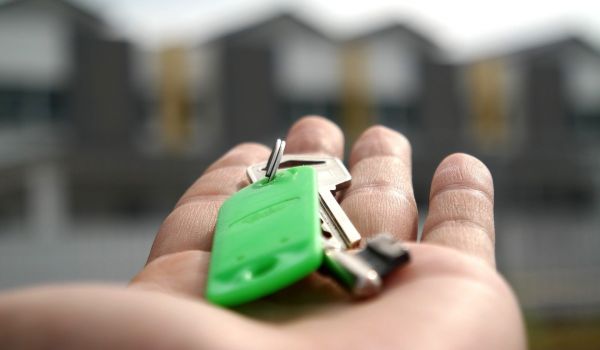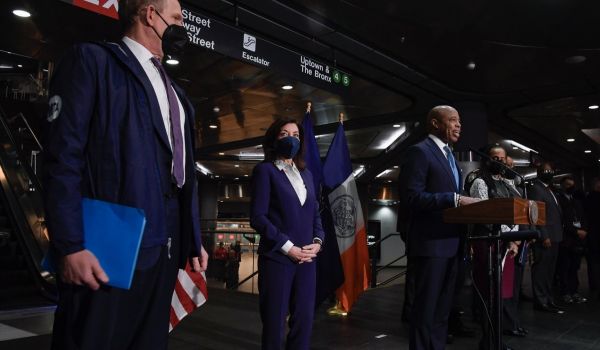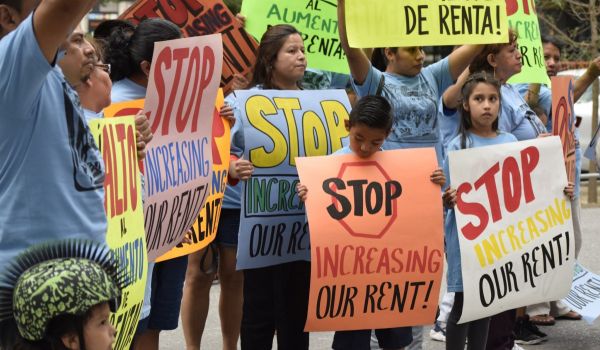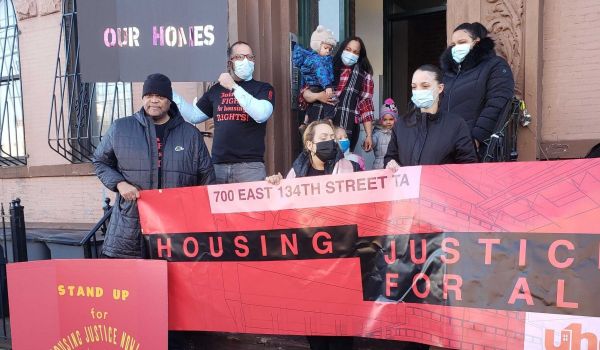When a wealthy donor left four L.A. apartment buildings to his alma mater upon his death, it left the 130 tenants of those buildings wondering if they were going to be evicted or have their rents hiked.
But on Jan. 10, tenants of the buildings in the Baldwin Hills neighborhood secured a major win when Boston University agreed to sell all four apartments to the Liberty Community Land Trust, which plans to keep the units permanently affordable.
“Boston University accepted our offer because of the collective pressure we put them under as a collective, as a community,” tenants wrote on their Instagram page. “When we fight, we win!!!”
The four buildings, World War II-era garden-style apartments, two of which are on Corbin Street and two on Clemson Street, were owned by BU alumnus Frederick Pardee, who left them to the school after his death. A former economist who went on to run a real estate management firm in Los Angeles, Pardee had donated more than $50 million to the school in the past. He died last June aged 89, but tenants had been organizing to purchase the portfolio before that.
Liberty Community Land Trust, which will buy the properties, declined to provide any information about the sale amount, saying it does not disclose its finances.
Jose Lopez, an organizer with the Corbett and Clemson tenant union, says he first inquired about the future of the four buildings while paying his rent in his building’s office about three years ago. That’s when he heard staff of the company that manages Pardee’s real estate portfolio mention that they had 20 fewer buildings. When Lopez asked what happened to the buildings, he was told Pardee had donated them to philanthropic causes and universities.
Lopez recognized this as a problem: If the buildings changed hands, the new owner could raise rents, try to deregulate the units or evict the current tenants, most of whom were low-income, Black and Latinx. But he also saw a potential solution: Since Pardee was a philanthropist interested in helping people, Lopez thought, he might be interested in donating or selling the buildings to tenants currently living there.
For Lopez, there was a lot on the line. He lives in a two-bedroom apartment on Corbett Street with his 94-year-old father, where they’ve been for 20 years. The younger Lopez pays $1,250 a month for the rent-regulated unit, and he says he can’t afford any rent increases on his income.
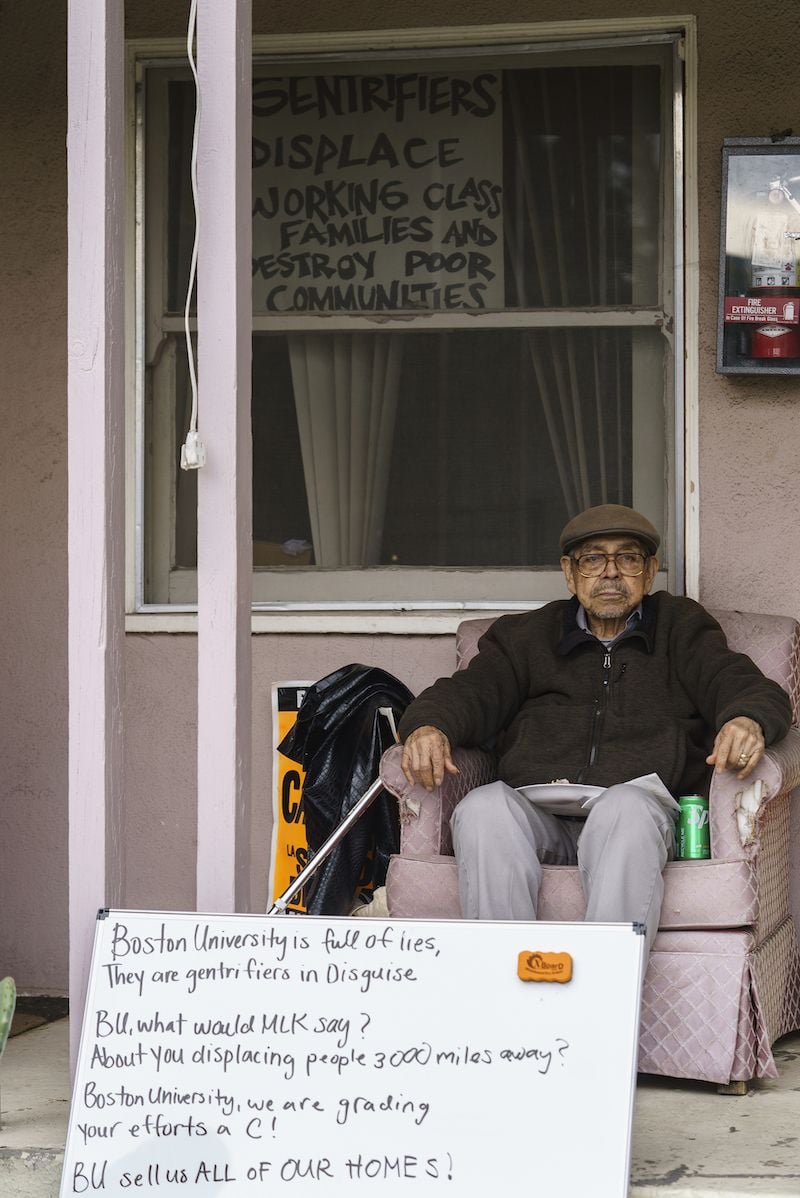
Tenant Jorge Lopez, 94, attends a community rally outside his home in the Baldwin Hills neighborhood urging Boston University officials not to sell their buildings to investors in Los Angeles, Sunday, Jan. 8, 2023. (Photo by Damian Dovarganes / AP Photo)
Lopez has thought about his prospects if rents were to go up; he and his father were already displaced once when they lived near Los Angeles International Airport. A similar building near him has two bedrooms for $2,600 and $2,900, and a new building nearby has two bedrooms at $5,000 – all far out of his range. He has thought about moving to the desert in Lancaster. But he says the rent there is still higher than what he’s paying. He even considered living in his car, but he’s seen people living in their vehicles get towed left and right.
“And then you make a house out of whatever materials and then they’re cleaning the sidewalks,” he says, considering his worst case scenario. “They’re tearing people’s last resort of living situations up.”
So Lopez reached out to Pardee through a letter, asking him about donating or selling the building to tenants. He never got a response; Lopez says since Pardee was already being cared for at this point, it’s not clear if management even delivered him the message.
“I think the management intercepted it and they just weren’t interested in what was happening,” he says.
When Pardee died in June of last year, Lopez didn’t hear about it until October from a tenant in another building. He reached out to Pardee’s building management to ask who would be handling the estate now that Pardee was dead, but was rebuffed.
“They completely brushed me off, they said, ‘You don’t have to worry about it, it’s none of your business, you’re a tenant, just keep on paying your rent and you’re going to be okay, nothing’s gonna happen,” Lopez says.
Lopez reached out to the LA Tenants Union, which offered organizational support and let tenants know their rights if the buildings were to be sold. Realizing that Pardee’s death would mean the building could transfer hands soon, Lopez reached out to the Liberty Community Land Trust, which has been involved in an effort to purchase the 41-acre Baldwin Hills-Crenshaw Plaza mall, to ask if they’d be interested in buying it.
In October, real estate agents began touring potential buyers through the property. On Dec. 12, 2022, Lopez says five different people came through; he remembers their luxury vehicles and the urgency with which the broker spoke to them. It seemed like they were trying to sell the property quickly, Lopez says.
Lopez got the broker’s business card and passed it to Liberty Community Land Trust, who began making offers. But eventually, Lopez learned that an offer for the building he lived in on Corbett Street had already been made to another buyer. And Liberty’s offers to buy the other three buildings did not seem to be going anywhere.
At this point, “there was no option other than to organize,” Lopez says. Tenants at Clemson and Corbett apartments – about 130 people across 40 units – started an Instagram account to get the word out about what they were going through. The account started getting supporters from the Bay Area to Arizona, Texas, Florida and Michigan.
The instagram’s message reached students at Boston University, particularly the school’s local Democratic Socialists of America branch. Aarohi Goel, 20, is a junior at BU and vice president of the school’s DSA chapter. Goel is also a member of the Greater Boston Tenants Union, which is how she first heard about BU’s impending sale of the properties.
“At first, I was like, ‘Oh, why is something in L.A. pertaining to Boston,’ and I saw that this was a sale being done by BU,” Goel says. After Goel brought it to their attention, the DSA chapter agreed that “these tenants should be the ones to own their homes, not some for profit buyer that the university is going to sell them to,” Goel says.
They found a script from the Corbett and Clemson tenants’ Instagram page and began a campaign to get students to contact the university administration. BU students, alumni and some faculty sent nearly 1,000 emails protesting the sale of the buildings, mostly sent to BU staff, including the president, vice president and associate vice president of real estate, Goel says. Other student groups, including the BU College Democrats, Students for Abolition and BU Graduate Workers United also joined in.
Goel was messaging with the Corbett Clemson tenant Instagram account throughout the entire process. “We were in very close contact the entire way through,” she says.
Lopez says that tenants in the four Baldwin Hills buildings were heartened by the support from BU students.
“To see that we’re so far from each other, yet there’s this vested interest from these strangers that we don’t know. It made us feel very, very, very happy, respected, and it made a difference,” Lopez says. One BU DSA member even visited the tenant union’s weekly Sunday meeting during a trip to L.A.
On Jan. 8, BU said it would come to the bargaining table to sell the three remaining buildings to the land trust, having already agreed to sell Lopez’s building to an outside bidder. Liberty CLT had offered a “backup bid” in case the buyer of the fourth building backed out.
Lopez says that the tenants of the four Corbett and Clemson buildings did not want to celebrate until all four buildings were sold to the land trust.
“We personally said that no tenants will be left behind,” he says. “It’s unfair for anybody, any tenant or any group or any unit, to be the sacrificial lamb.”
The campaign on social media, emails to administrators and press conferences continued, calling for all four buildings to go to the CLT.
Then on Jan. 10, the bidder on Lopez’s building backed out. BU agreed to sell the property to Liberty, keeping all four buildings together.
Lopez says he isn’t sure why BU agreed to sell the buildings to the land trust, but he doesn’t attribute it to altruism. “It was too much bad press,” he says. “Whether or not they genuinely realize that they made an error and they’re genuinely coming to the table to do a good deed or not, I can’t say.”
Lopez points out that BU received the buildings for free and could have donated them to the tenants if they wanted. “We had to organize against them to simply enter into a business deal,” he says. “It was kind of lost on them that this could really uproot our lives.”
Goel, at the BU DSA, agrees. “I don’t think that the tenants should have had to fight for this because (Boston University) did acquire these buildings at zero cost and so they still turned a profit,” Goel says.
Boston University is not wanting for cash. The school reported that it had a $3 billion endowment in 2022. Its endowment grew by $1 billion in the first year of the pandemic. The school’s tuition is $61,000 a year.
“I think they picked the wrong broker, I’ll leave it at that,” says Damien Goodmon, Board Secretary-Treasurer at the Liberty Community Land Trust. “And now we’re just happy things have turned out the way that they have so far.”
Lawyers are still working out the details of the sale. When Liberty officially purchases the buildings, they’ll be tasked with repairing all of them to bring them up to code.
Lopez says his building currently has “borderline slum conditions,” including termite damage, mold, broken pipes, leaks and water backing up. He says his window has been broken for a year; he’s asked for repairs, but thinks that building management didn’t think it was important since the building was being sold. He also had mold in his bedroom and was sleeping in his living room for a year.
There have not been any definitive decisions about the leadership structure for the land trust, including how tenants will participate in the land trust and whether they will eventually become co-owners. Goodmon says this is all being worked out in conversation with tenants, which are in their early stages.
“You don’t want to make decisions for the tenants,” Goodmon says. “You want to work with the tenants to make the decisions for themselves, and in the meantime, we’ll be making sure the speculators don’t get the building.”
Lopez says he’s hoping that tenants will get ownership of their units. He personally wants to make sure the units are permanently affordable, and eventually sold at a price affordable to other lower-income households like themselves.
The whole process would have been easier, he said, if L.A. had enacted a Tenant Opportunity to Purchase Act, which would grant tenants the right of first refusal when a building goes up for sale. Land trusts across the county have been advocating for such a law, including Liberty CLT.
“If we would have had TOPA…we wouldn’t be wasting all this time and effort and stress,” Lopez says.
This article is part of Backyard, a newsletter exploring scalable solutions to make housing fairer, more affordable and more environmentally sustainable. Subscribe to our weekly Backyard newsletter.

Roshan Abraham is Next City's housing correspondent and a former Equitable Cities fellow. He is based in Queens. Follow him on Twitter at @roshantone.



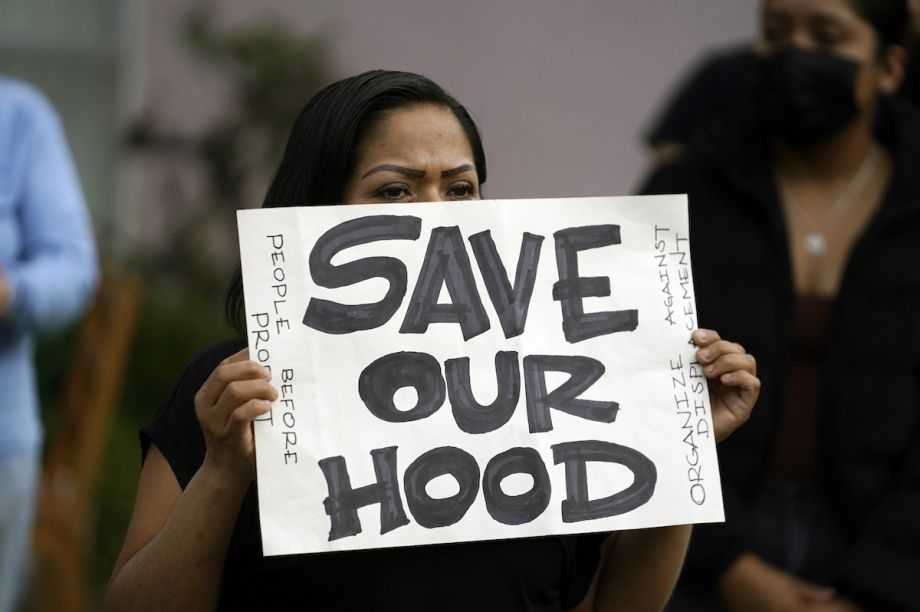
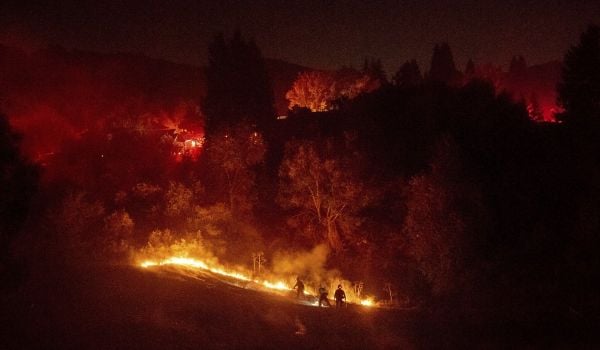
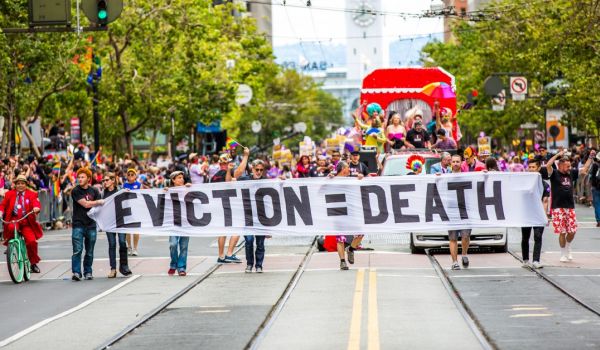
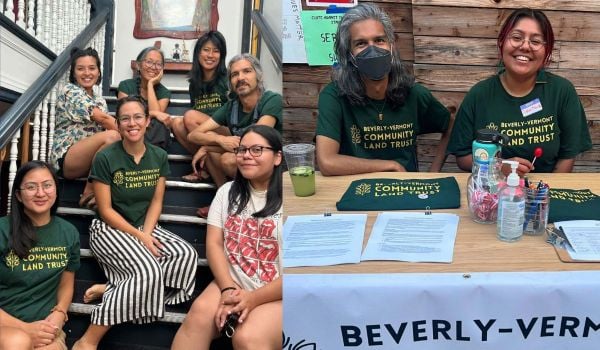
_600_350_80_s_c1.jpg)
